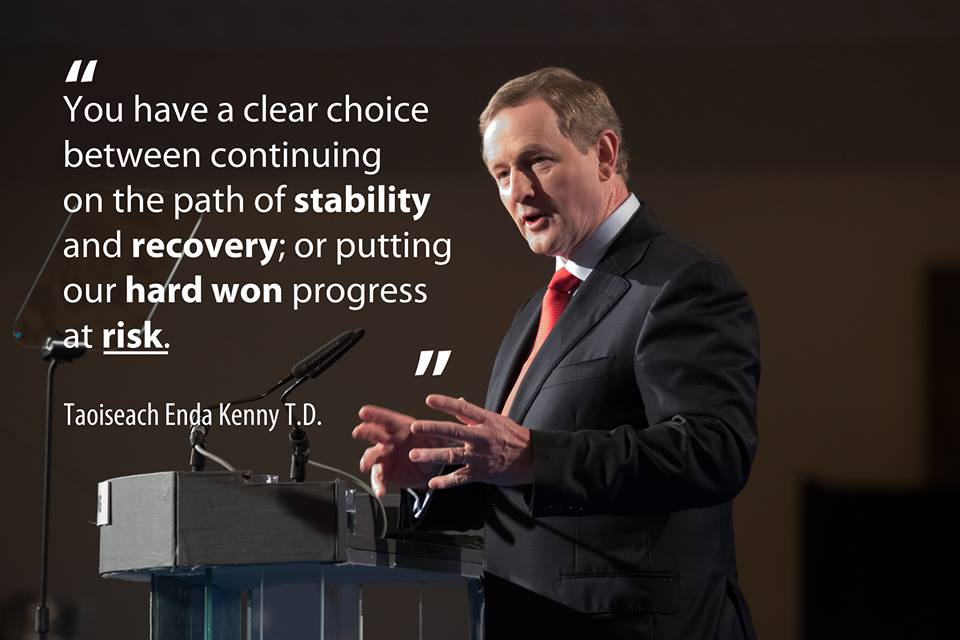
@radiobrendan
What heady times they are experiencing back on the homeland. Excitement is almost at an unprecedented level as the electorate in the Republic of Ireland gets ready to go to the polls on February 26th to vote for a new parliament.
In the relatively short campaign — the election was only called earlier this month — one of the headline issues, going by national media anyway, has been that massive thorn in every Irish person’s side: the fiscal space.
No, it’s not some new Hollywood blockbuster that depicts us Paddies in a shady light. Rather, in the language that we ‘ordinary folk’ use, it’s basically that sexy issue of how much money the new government will have to play around with during its five-year term in office — should it last that long that is. Who needs a Donald Trump to glam things up when you’ve got fiscal space to concern yourself with?
OK, OK, being serious for a moment, every country, in theory anyway, should be doing its best to balance the financial books, so it is an important issue. What’s more, promises are ten-a-penny at election time, so by knowing the financial restraints the electorate and media can call the bluff on politicians who have overly fantastical manifestos.
Yet, coming back to Donald Trump and the ostentatious, populous, superficial type of campaigning we’ve seen in the US, the idea of talking about financial constraints doesn’t seem part of the (Hollywood-style) script. Sure the United States has a massive national debt, but it’s just numbers on a page. And this is the United States we’re referring to: a country that has been practically built on bankruptcy.
It’s only small, insignificant states, such as Ireland and others in worse conditions, that concern themselves about such tedious matters. And the piper’s fee is relatively large. Some of us not only have to stick to the mantra but actually practice it as well so that it at least appears that all this borrowed money will be paid back some day; the system would of course fail without it.
As ever with such things, it’s not those preaching the need to be financially prudent who tend to suffer the reality of meeting imposed monetary targets. No, it’s the hard-pressed working classes who usually bear the brunt of state-enforced austerity — a state lying prostrate and feeble in front of the globe’s all-powerful financial markets. The politicians who bow to every condition enforced by these untouchable forces live in a different, sheltered world to the rest of us little people.
But hey, who are we to pass judgement? In the Irish context, our ‘leaders’ are boldly and selflessly crunching numbers (but not their salaries) in a bid to find a formula to conquer the dark fiscal space — in the national interest that is.
Never mind the day-to-day, real issues blighting the masses, this space stuff is way more exciting.
__________________________________________________________
Facebook: Wrong Way Corrigan – The Blog & IQuiz «The Bogotá Pub Quiz».





I’m sorry but 19 trillions USD is just numbers in a page? No this is more than just a number, this could be the trigger that pulverizes fiat currencies if that is what the privately owned federal reserve chooses to. You have to be naive to not accept the fact that the dollar is the blood that flows in a debt driven ecomy and its heart is the federal reserve; in other words, the fate of the world relies on a handful of people.
On the other hand I find it odd that this article has absolutely nothing to do with Colombia, and politely I tell you not many folks care about Ireland. Although from what you’ve written it doesn’t surprise me at all. The guys in the left in Europe must understand that the government needs to not intervene in the free market, that means no bail outs and getting the heck out of the European Union, perhaps leaving it’s positive sides such as the free treaty agreements, spending needs to be cut down , including the freebies for all, specially to the invaders who are commanded by the Quran to takeover your land and have Sharia law in your nation.
Califica:
-
Me
gusta
0
- No me
gusta
0
ReportarThis article, nay blog, doesn’t have to be about Colombia. But if you come from a South American origin, you couldn’t but relate to the fact how the likes of the IMF and World Bank has interfered in less than positive ways in a host of countries in the region. The rich get wildly richer, the poor get much poorer. It’s all playing into the hands of those «handful of people» we all ‘rely on’ to keep us alive …
Califica:
-
Me
gusta
0
- No me
gusta
0
Reportar